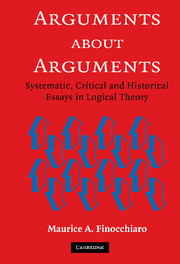Book contents
- Frontmatter
- Contents
- Preface and Acknowledgments
- Introduction : An Approach to a Branch of Logic
- Theorizing about reasoning and argument
- Fallacies and asymmetries
- Critiques
- 10 Siegel on Critical Thinking : Reasoning versus Rationality versus Criticism (1989)
- 11 Induction and Intuition in the Normative Study of Reasoning : Cohen on Inductive Reasoning in Philosophy (1991)
- 12 Logic, Politics, and Gramsci
- 13 The Dialectical Approach to Interpretation and Evaluation : From Axiom to Dialogue (Barth) and from Structure to Dialogue (Freeman) (1995)
- 14 The Port-Royal Logic's Theory of Argument
- 15 A Critique of the Dialectical Approach, Part Ⅱ : The Amsterdam School and Walton on Complex Dialogues (1999)
- 16 Valid Ad Hominem Arguments in Philosophy
- 17 Dialectics, Evaluation, and Argument : Goldman and Johnson on the Concept of Argument (2003)
- Historical analyses
- Selected Bibliography
- Index
14 - The Port-Royal Logic's Theory of Argument
Instrumentalism in the Philosophy of Logic (1997)
from Critiques
Published online by Cambridge University Press: 05 February 2015
- Frontmatter
- Contents
- Preface and Acknowledgments
- Introduction : An Approach to a Branch of Logic
- Theorizing about reasoning and argument
- Fallacies and asymmetries
- Critiques
- 10 Siegel on Critical Thinking : Reasoning versus Rationality versus Criticism (1989)
- 11 Induction and Intuition in the Normative Study of Reasoning : Cohen on Inductive Reasoning in Philosophy (1991)
- 12 Logic, Politics, and Gramsci
- 13 The Dialectical Approach to Interpretation and Evaluation : From Axiom to Dialogue (Barth) and from Structure to Dialogue (Freeman) (1995)
- 14 The Port-Royal Logic's Theory of Argument
- 15 A Critique of the Dialectical Approach, Part Ⅱ : The Amsterdam School and Walton on Complex Dialogues (1999)
- 16 Valid Ad Hominem Arguments in Philosophy
- 17 Dialectics, Evaluation, and Argument : Goldman and Johnson on the Concept of Argument (2003)
- Historical analyses
- Selected Bibliography
- Index
Summary
Introduction
The Port-Royal Logic is the common title given to a work first published in French in 1662. The original title translates into English as Logic or the Art of Thinking. Its principal author was Antoine Arnauld, a priest, theologian, and philosopher who was born in 1612 and died in 1694. A secondary author was Pierre Nicole, and there were other lesser but unknown contributors. They all belonged to that intellectual and religious movement known as Port Royal, which for a time included Pascal. Besides a large number of theological works, Arnauld also authored two other books which are worth mentioning here: the New Elements of Geometry, which was a philosophical reworking of Euclid; and the General and Rational Grammar, which became known as the Port-Royal Grammar.
The Port-Royal Logic has recently been called “the most influential logic from Aristotle to the end of the nineteenth century” (Buroker 1996, p. ⅹⅻⅰ). And an earlier reader, pupil of Sir William Hamilton and professor of logic at the University of St. Andrews, claimed in 1850 that the Port-Royal Logic “has never been superseded” (Baynes 1850, p. ⅹⅹ). Although these judgments are perhaps exaggerated, it is an incontrovertible fact that the work has had a spectacular success as a long-lasting and international best-seller. For example, in French there were five editions and a total of fourteen printings during Arnauld's own lifetime, and at least forty-nine editions and reprints since his death (Clair and Girbal 1965, 4–7).
- Type
- Chapter
- Information
- Arguments about ArgumentsSystematic, Critical, and Historical Essays In Logical Theory, pp. 246 - 264Publisher: Cambridge University PressPrint publication year: 2005



